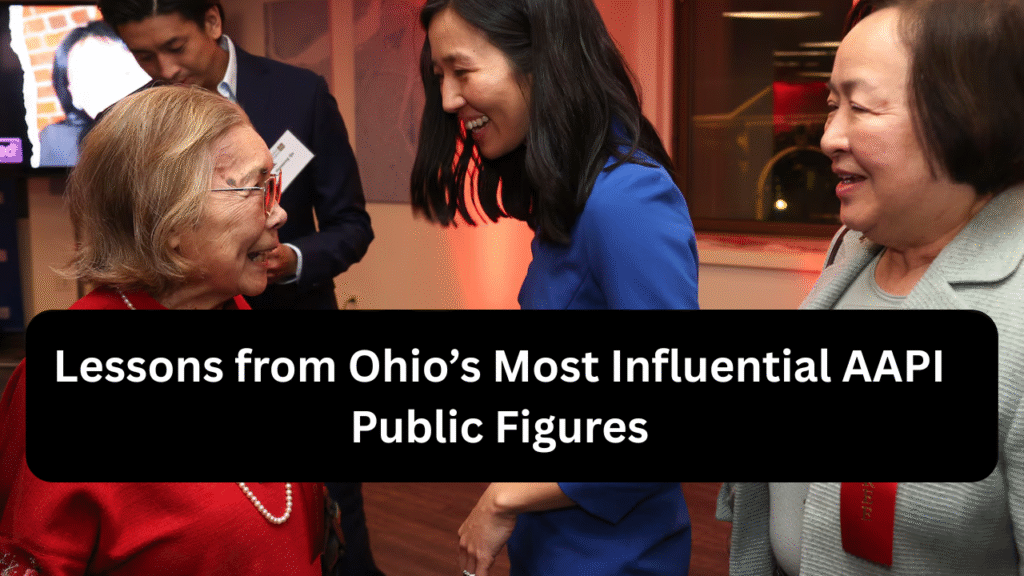
Asian American and Pacific Islander (AAPI) communities have been steadily increasing their presence in Ohio’s public sphere, contributing to political, social, and cultural advancements. The journeys of Ohio’s most influential AAPI public figures provide valuable lessons in leadership, resilience, and community engagement. These leaders exemplify how dedication, advocacy, and strategic networking can overcome barriers and inspire future generations. This article highlights key lessons from their experiences, illustrating paths to impactful public service.
The Growing Influence of AAPI Leaders in Ohio
Ohio, known for its political diversity and demographic variety, has seen AAPI leaders emerge across multiple sectors including politics, education, business, and civic activism. Their influence extends beyond representation, shaping policies and community narratives. Understanding their journeys reveals strategies and mindsets critical to overcoming systemic challenges.
Key Lessons from Ohio’s Influential AAPI Public Figures
1. Embrace Cultural Identity as Strength
Many Ohio AAPI leaders emphasize the importance of embracing their heritage. Cultural identity provides a unique perspective that enriches policy discussions and leadership styles. It also fosters deeper connections with diverse communities.
2. Build Grassroots Support
Successful leaders often start by engaging deeply within their local communities, volunteering, and addressing immediate neighborhood needs. This grassroots foundation creates trust and a reliable support base.
3. Overcome Stereotypes with Excellence and Authenticity
AAPI public figures in Ohio combat stereotypes by consistently demonstrating competence, integrity, and authenticity. Breaking down misconceptions requires both performance and staying true to personal and cultural values.
4. Prioritize Education and Continuous Learning
Education is a recurring theme in the paths of Ohio’s AAPI leaders. Many pursue advanced degrees or specialized training to equip themselves with knowledge and skills that enhance their leadership effectiveness.
5. Leverage Networks and Mentorship
Building strong professional and political networks is crucial. Mentorship from established leaders provides guidance, opens doors, and helps navigate political landscapes.
6. Advocate for Inclusive Policies
AAPI leaders in Ohio actively champion policies that promote diversity, equity, and inclusion, recognizing that their advocacy benefits not only their communities but the broader society.
Table: Lessons and Strategies from Ohio’s AAPI Public Figures
| Lesson | Description | Example Application | Outcome | Advice for Aspiring Leaders |
|---|---|---|---|---|
| Embrace Cultural Identity | Use heritage as a leadership asset | Incorporate cultural perspectives | Builds community trust | Celebrate your background openly |
| Build Grassroots Support | Engage in local volunteering and activism | Community outreach programs | Strong voter and community base | Start local, listen closely |
| Overcome Stereotypes | Demonstrate excellence and authenticity | Transparent leadership | Breaks down misconceptions | Stay true to your values |
| Prioritize Education | Pursue higher education and skills development | Advanced degrees, training | Enhanced leadership credibility | Commit to lifelong learning |
| Leverage Networks & Mentorship | Connect with mentors and allies | Political endorsements, partnerships | Access to opportunities | Seek mentors actively |
| Advocate Inclusive Policies | Promote diversity and equity | Policy initiatives and community forums | Broader societal impact | Focus on inclusive advocacy |
Ohio AAPI Leaders: Profiles and Their Impact
- Dr. Hyeon-Ju Pak:
A prominent educator and community advocate, Dr. Pak has leveraged her academic background to promote educational equity for minority students in Ohio. Her work highlights how education serves as a foundation for social change. - Senator Tina Maharath:
As Ohio’s first Asian American state senator, Maharath’s journey emphasizes the importance of grassroots organizing and authentic leadership in breaking barriers. - Ravi K. Patel:
A civil rights attorney and community leader, Patel’s advocacy for immigrant rights and equitable policies reflects the power of combining legal expertise with community activism. - Mei Chen:
A business leader turned civic activist, Chen demonstrates how professional experience can translate into effective community leadership and policy influence. - Anita Das:
An influential nonprofit leader, Das champions mental health awareness within AAPI populations, illustrating the importance of addressing community-specific issues.
Common Themes in Their Success
- Resilience: Overcoming systemic barriers such as racial bias and political underrepresentation requires persistence and adaptability.
- Community-Centered Leadership: Prioritizing community needs fosters loyalty and strengthens electoral support.
- Strategic Communication: Effectively sharing their stories and policy goals helps increase visibility and public support.
- Mentorship Culture: Passing down knowledge to emerging leaders sustains community empowerment.
Overview Table: Ohio’s AAPI Public Figures – Lessons and Takeaways
| Leader | Background | Key Lesson | Impact Area | Notable Achievement |
|---|---|---|---|---|
| Dr. Hyeon-Ju Pak | Education | Education as empowerment | Educational equity | Advocacy for minority students |
| Senator Tina Maharath | Politics | Grassroots and authenticity | State legislation | First Asian American state senator |
| Ravi K. Patel | Law | Combining legal advocacy with activism | Immigrant rights | Landmark policy advocacy |
| Mei Chen | Business and Civic Work | Professional experience in leadership | Community development | Leading local civic initiatives |
| Anita Das | Nonprofit Sector | Addressing community health needs | Mental health awareness | Expanding AAPI mental health services |
FAQs
Q1: What key qualities help AAPI leaders succeed in Ohio politics?
A1: Authenticity, resilience, community engagement, and education are critical to their success.
Q2: How do AAPI leaders overcome cultural and racial stereotypes?
A2: By demonstrating consistent excellence, building trust, and embracing their cultural identity openly.
Q3: Why is mentorship important for AAPI political aspirants?
A3: Mentorship provides guidance, networking opportunities, and helps navigate political challenges effectively.
